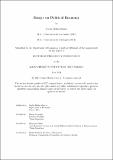Essays on Political Economy
Author(s)
Molina, Carlos Molina
DownloadThesis PDF (8.803Mb)
Advisor
Acemoglu, Daron
Olken, Benjamin
Terms of use
Metadata
Show full item recordAbstract
This dissertation is a collection of three papers on political economy that explore several of the most salient political events in recent decades, including the rise in affective polarization, protests, and high levels of corruption in developing countries. These events can severely affect the success of democratic institutions, which are vital for economic development. In Chapter 1, I study the role of social influence on social media in explaining individuals' preferences for biased news. I design and conduct a field experiment on Twitter to identify this effect and its potential mechanisms. The chapter demonstrates one mechanism through which social media can attenuate the demand for polarizing content: as these platforms amplify the visibility of user interactions, thereby increasing the importance of social image concerns, users adjust their news consumption to be more balanced. In Chapter 2, I investigate the effects of social media on collective action. By exploiting Facebook's release in a specific language as an exogenous source of variation in access to social media where the language is spoken, I show that Facebook, the largest social media platform, has had a significant and sizable positive impact on citizen protests. In Chapter 3, I document evidence of an unexplored yet common form of vote-buying: voter registration shifting. I demonstrate that this practice drastically affects 15% of local elections in Colombia. By employing quasi-experimental methods, I illustrate how the (future) allocation of transfers from central to local governments creates perverse incentives for political candidates to redistribute vote-buying.
Date issued
2024-05Department
Massachusetts Institute of Technology. Department of EconomicsPublisher
Massachusetts Institute of Technology